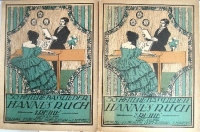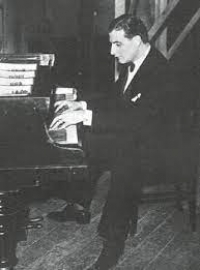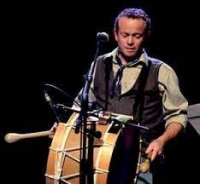Piano Sheet Music
 "My goal is to be one with the music. I just dedicate my whole life to this art." Jimi Hendrix
"My goal is to be one with the music. I just dedicate my whole life to this art." Jimi Hendrix
Traditional

Brad Kilman

Brad Kilman Musical artist YouTube Music Songs We Are Hungry Clouds Are Forming · 2004 Meet You In The Morning
Mouths Like Trumpets · 2009 From This Time Forth Mouths Like Trumpets · 2009.
Mouths Like Trumpets · 2009 From This Time Forth Mouths Like Trumpets · 2009.
Show Luo

Show Lo Chih Hsiang (simplified Chinese: 罗志祥; traditional Chinese: 羅志祥; pinyin: Luó Zhìxiáng; born July 30, 1979) is a Taiwanese singer, actor and host. He is commonly known by his nickname Hsiao Chu (Little Pig) (Chinese: 小豬). Lo is recognized for his trademark dance music and comedic talent. He has over 50 million followers on Chinese micro-blogging platform Weibo as of June 2018.
Owl City
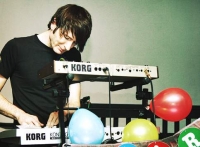
Owl City is an American synthpop musical project by Adam Young. Young started out making music in his parents' basement in Owatonna, Minnesota which he claims is a result of his insomnia.
Young's influences are disco and European electronic music. After two independent albums, Owl City gained mainstream popularity from the 2009 major label debut album Ocean Eyes, which spawned the U.S. Billboard Hot 100 #1 hit single "Fireflies". "Fireflies" topped the US and Canadian charts and became the most-downloaded song on iTunes in the US, and the album Ocean Eyes reached the top ten on the US album charts and topped the US electronic charts. Ocean Eyes also reached Amazon MP3's top 10 most downloaded album list. By December 2009, it was certified Gold in the United States.
Young's influences are disco and European electronic music. After two independent albums, Owl City gained mainstream popularity from the 2009 major label debut album Ocean Eyes, which spawned the U.S. Billboard Hot 100 #1 hit single "Fireflies". "Fireflies" topped the US and Canadian charts and became the most-downloaded song on iTunes in the US, and the album Ocean Eyes reached the top ten on the US album charts and topped the US electronic charts. Ocean Eyes also reached Amazon MP3's top 10 most downloaded album list. By December 2009, it was certified Gold in the United States.
Elton John

Sir Elton Hercules John CBE (born Reginald Kenneth Dwight on 25 March 1947) is an English pop/rock singer, composer and pianist.
In his four-decade career, John has been one of the dominant forces in rock and popular music, especially during the 1970s. He has sold over 200 million records, making him one of the most successful artists of all time. He has more than 50 Top 40 hits including seven consecutive No. 1 U.S. albums, 59 Top 40 singles, 16 Top 10, four No. 2 hits, and nine No. 1 hits. He has won five Grammy awards and one Academy Award. His success has had a profound impact on popular music and has contributed to the continued popularity of the piano in rock and roll. In 2004, Rolling Stone ranked him #49 on their list of the 100 greatest artists of all time.
Some of the characteristics of John's musical talent include an ability to quickly craft melodies for the lyrics of songwriting partner Bernie Taupin, his former rich tenor (now baritone) voice, his classical and gospel-influenced piano, the aggressive orchestral arrangements of Paul Buckmaster among others and the flamboyant fashions, outlandishly excessive eyeglasses, and on-stage showmanship, especially evident during the 1970s.
John was inducted into the Rock and Roll Hall of Fame in 1994. He has been heavily involved in the fight against AIDS since the late 1980s, and was knighted in 1998. He entered into a civil partnership with David Furnish on 21 December 2005 and continues to be a champion for LGBT social movements. On April 9, 2008, John held a benefit concert for Hillary Clinton's presidential campaign, raising $2.5 million.
In his four-decade career, John has been one of the dominant forces in rock and popular music, especially during the 1970s. He has sold over 200 million records, making him one of the most successful artists of all time. He has more than 50 Top 40 hits including seven consecutive No. 1 U.S. albums, 59 Top 40 singles, 16 Top 10, four No. 2 hits, and nine No. 1 hits. He has won five Grammy awards and one Academy Award. His success has had a profound impact on popular music and has contributed to the continued popularity of the piano in rock and roll. In 2004, Rolling Stone ranked him #49 on their list of the 100 greatest artists of all time.
Some of the characteristics of John's musical talent include an ability to quickly craft melodies for the lyrics of songwriting partner Bernie Taupin, his former rich tenor (now baritone) voice, his classical and gospel-influenced piano, the aggressive orchestral arrangements of Paul Buckmaster among others and the flamboyant fashions, outlandishly excessive eyeglasses, and on-stage showmanship, especially evident during the 1970s.
John was inducted into the Rock and Roll Hall of Fame in 1994. He has been heavily involved in the fight against AIDS since the late 1980s, and was knighted in 1998. He entered into a civil partnership with David Furnish on 21 December 2005 and continues to be a champion for LGBT social movements. On April 9, 2008, John held a benefit concert for Hillary Clinton's presidential campaign, raising $2.5 million.
Ennio Morricone
Ennio Morricone, OMRI (born November 10, 1928), is an Italian composer and conductor. He has composed and arranged scores for more than 500 film and television productions. Morricone is considered as one of the most influential film composers since the late 1950s. He is well-known for his long-term collaborations with international acclaimed directors such as Sergio Leone, Brian De Palma, Barry Levinson, and Giuseppe Tornatore.
He wrote the characteristic film scores of Leone's Spaghetti Westerns A Fistful of Dollars (1964), For a Few Dollars More (1965), The Good, the Bad and the Ugly (1966), Once Upon a Time in the West (1968), The Great Silence (1968), and My Name Is Nobody (1973). In the 80s, Morricone composed the scores for John Carpenter's horror movie The Thing (1982), Leone's Once Upon a Time in America (1984), Roland Joffé's The Mission (1986), Brian De Palma's The Untouchables (1987) and Giuseppe Tornatore's Cinema Paradiso (1988).
His more recent compositions include the scores for Oliver Stone's U Turn (1997), Tornatore's The Legend of 1900 (1998) and Malèna (2000), Mission to Mars (2000) by Brian De Palma, Fateless (2005), and Baaria - La porta del vento (2009). Ennio Morricone has won two Grammy Awards, two Golden Globes and five Anthony Asquith Awards for Film Music by BAFTA in 1979–1992. He has been nominated for five Academy Awards for Best Music, Original Score in 1979–2001. Morricone received the Honorary Academy Award in 2007 "for his magnificent and multifaceted contributions to the art of film music". He was the second composer to receive this award after its introduction in 1928.
He wrote the characteristic film scores of Leone's Spaghetti Westerns A Fistful of Dollars (1964), For a Few Dollars More (1965), The Good, the Bad and the Ugly (1966), Once Upon a Time in the West (1968), The Great Silence (1968), and My Name Is Nobody (1973). In the 80s, Morricone composed the scores for John Carpenter's horror movie The Thing (1982), Leone's Once Upon a Time in America (1984), Roland Joffé's The Mission (1986), Brian De Palma's The Untouchables (1987) and Giuseppe Tornatore's Cinema Paradiso (1988).
His more recent compositions include the scores for Oliver Stone's U Turn (1997), Tornatore's The Legend of 1900 (1998) and Malèna (2000), Mission to Mars (2000) by Brian De Palma, Fateless (2005), and Baaria - La porta del vento (2009). Ennio Morricone has won two Grammy Awards, two Golden Globes and five Anthony Asquith Awards for Film Music by BAFTA in 1979–1992. He has been nominated for five Academy Awards for Best Music, Original Score in 1979–2001. Morricone received the Honorary Academy Award in 2007 "for his magnificent and multifaceted contributions to the art of film music". He was the second composer to receive this award after its introduction in 1928.
Jesus Christ Superstar

Jesus Christ Superstar is a rock opera by Tim Rice and Andrew Lloyd Webber. Released as a double-album in 1970, it highlights the political and interpersonal struggles of Judas Iscariot and Jesus. The action largely follows the canonical gospels' accounts of the last weeks of Jesus' life, beginning with Jesus and his followers arriving in Jerusalem and ending with the Crucifixion. Twentieth-century attitude and sensibilities as well as contemporary slang pervade the lyrics, and ironic allusions to modern life are scattered throughout the political depiction of the events. Stage and film productions accordingly feature many intentional anachronisms.
A large part of the plot focuses on the character of Judas who is depicted as a confused, tragic figure who is not satisfied with what he views as Jesus's lack of planning, and alarmed by the relatively recent claims of his divinity.
A large part of the plot focuses on the character of Judas who is depicted as a confused, tragic figure who is not satisfied with what he views as Jesus's lack of planning, and alarmed by the relatively recent claims of his divinity.
Hector Berlioz

Hector Berlioz (December 11, 1803 – March 8, 1869) was a French Romantic composer, best known for his compositions Symphonie fantastique and Grande messe des morts (Requiem). Berlioz made significant contributions to the modern orchestra with his Treatise on Instrumentation. He specified huge orchestral forces for some of his works; as a conductor, he performed several concerts with more than 1,000 musicians. He also composed around 50 songs. His influence was critical for the further development of Romanticism, especially in composers like Richard Wagner, Nikolai Rimsky-Korsakov, Franz Liszt, Richard Strauss, Gustav Mahler and many others.
Thoinot Arbeau
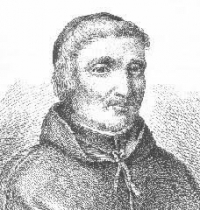
Thoinot Arbeau is the anagrammatic pen name of French cleric Jehan Tabourot. Tabourot is most famous for his Orchésographie, a study of late sixteenth-century French Renaissance social dance. He was born in Dijon and died in Langres.
Bach

Johann Sebastian Bach (31 March 1685 – 28 July 1750) was a German composer and organist whose sacred and secular works for choir, orchestra, and solo instruments drew together the strands of the Baroque period and brought it to its ultimate maturity. Although he introduced no new forms, he enriched the prevailing German style with a robust contrapuntal technique, an unrivalled control of harmonic and motivic organisation in composition for diverse musical forces, and the adaptation of rhythms and textures from abroad, particularly Italy and France.
Revered for their intellectual depth and technical and artistic beauty, Bach's works include the Brandenburg concertos; the Goldberg Variations; the English Suites, French Suites, Partitas, and Well-Tempered Clavier; the Mass in B Minor; the St. Matthew Passion; the St. John Passion; The Musical Offering; The Art of Fugue; the Sonatas and Partitas for violin solo; the Cello Suites; more than 200 surviving cantatas; and a similar number of organ works, including the celebrated Toccata and Fugue in D Minor.
While Bach's fame as an organist was great during his lifetime, he was not particularly well-known as a composer. His adherence to Baroque forms and contrapuntal style was considered "old-fashioned" by his contemporaries, especially late in his career when the musical fashion tended towards Rococo and later Classical styles. A revival of interest and performances of his music began early in the 19th century, and he is now widely considered to be one of the greatest composers in the Western tradition.
Revered for their intellectual depth and technical and artistic beauty, Bach's works include the Brandenburg concertos; the Goldberg Variations; the English Suites, French Suites, Partitas, and Well-Tempered Clavier; the Mass in B Minor; the St. Matthew Passion; the St. John Passion; The Musical Offering; The Art of Fugue; the Sonatas and Partitas for violin solo; the Cello Suites; more than 200 surviving cantatas; and a similar number of organ works, including the celebrated Toccata and Fugue in D Minor.
While Bach's fame as an organist was great during his lifetime, he was not particularly well-known as a composer. His adherence to Baroque forms and contrapuntal style was considered "old-fashioned" by his contemporaries, especially late in his career when the musical fashion tended towards Rococo and later Classical styles. A revival of interest and performances of his music began early in the 19th century, and he is now widely considered to be one of the greatest composers in the Western tradition.
James P. Johnson

James P. Johnson (born James Price Johnson, also known as Jimmy Johnson; February 1, 1894 – November 17, 1955) was an American pianist and composer. A pioneer of the stride style of jazz piano, he was one of the most important pianists who bridged the ragtime and jazz eras, and, with Jelly Roll Morton, one of the two most important catalysts in the evolution of ragtime piano into jazz. As such, he was a model for Count Basie, Duke Ellington, Art Tatum, and Fats Waller.
Johnson composed many hit tunes including the theme song of the Roaring Twenties, "Charleston" and "If I Could be With You One Hour Tonight" and remained the acknowledged king of New York jazz pianists through most of the 1930s. Johnson's artistry, his significance in the subsequent development of jazz piano, and his large contribution to American musical theatre, are often overlooked, and as such, he has been referred to by Reed College musicologist David Schiff, as "The Invisible Pianist".
Johnson composed many hit tunes including the theme song of the Roaring Twenties, "Charleston" and "If I Could be With You One Hour Tonight" and remained the acknowledged king of New York jazz pianists through most of the 1930s. Johnson's artistry, his significance in the subsequent development of jazz piano, and his large contribution to American musical theatre, are often overlooked, and as such, he has been referred to by Reed College musicologist David Schiff, as "The Invisible Pianist".
Guy Bergeron
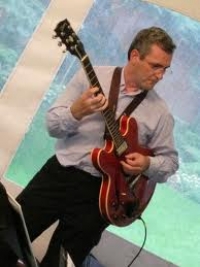
Guy Bergeron was born the 13th of October 1964 in Loretteville, Province of Quebec, Canada. He graduated in music: in 1990, 3rd cycle in composition at the Conservatoire de musique of Quebec; in 1986, collegial grade (DEC) in pop music, Cegep of Drummondville, and in 1984, collegial grade (DEC) in music, Cegep of Ste-Foy, with guitar as first instrument. He was also a student in jazz interpretation from 1992 until 1994 at the University of Montreal (electric guitar) and he studied computer-assisted music at the Musitechnic School in Montreal. He plays the guitar (classical, electric, acoustic, synthesizer), the banjo, the mandolin and the bass. He's been earning his living with music for more than 25 years, as a professional musician, a composer, an arranger and also as a studio engineer as he manages his own studio.
Gus Khan

Gustav Gerson Kahn (November 6, 1886 – October 8, 1941) was an American lyricist who contributed a number of songs to the Great American Songbook, including "Pretty Baby", "Ain't We Got Fun?", "Carolina in the Morning", "Toot, Toot, Tootsie (Goo' Bye!)", "My Buddy" "I'll See You in My Dreams", "It Had to Be You", "Yes Sir, That's My Baby", "Love Me or Leave Me", "Makin' Whoopee", "My Baby Just Cares for Me", "I'm Through with Love", "Dream a Little Dream of Me" and "You Stepped Out of a Dream".
J. S. Bach
Johann Sebastian Bach (21 March 1685, O.S.31 March 1685, N.S. – 28 July 1750, N.S.) was a German composer, organist, harpsichordist, violist, and violinist whose sacred and secular works for choir, orchestra, and solo instruments drew together the strands of the Baroque period and brought it to its ultimate maturity. Although he did not introduce new forms, he enriched the prevailing German style with a robust contrapuntal technique, an unrivalled control of harmonic and motivic organisation, and the adaptation of rhythms, forms and textures from abroad, particularly from Italy and France.
Revered for their intellectual depth, technical command and artistic beauty, Bach's works include the Brandenburg Concertos, the Goldberg Variations, the Partitas, The Well-Tempered Clavier, the Mass in B minor, the St Matthew Passion, the St John Passion, the Magnificat, A Musical Offering, The Art of Fugue, the English and French Suites, the Sonatas and Partitas for solo violin, the Cello Suites, more than 200 surviving cantatas, and a similar number of organ works, including the famous Toccata and Fugue in D minor and Passacaglia and Fugue in C minor, as well as the Great Eighteen Chorale Preludes and Organ Mass.
Bach's abilities as an organist were highly respected throughout Europe during his lifetime, although he was not widely recognised as a great composer until a revival of interest and performances of his music in the first half of the 19th century. He is now generally regarded as one of the main composers of the Baroque style, and as one of the greatest composers of all time.
Revered for their intellectual depth, technical command and artistic beauty, Bach's works include the Brandenburg Concertos, the Goldberg Variations, the Partitas, The Well-Tempered Clavier, the Mass in B minor, the St Matthew Passion, the St John Passion, the Magnificat, A Musical Offering, The Art of Fugue, the English and French Suites, the Sonatas and Partitas for solo violin, the Cello Suites, more than 200 surviving cantatas, and a similar number of organ works, including the famous Toccata and Fugue in D minor and Passacaglia and Fugue in C minor, as well as the Great Eighteen Chorale Preludes and Organ Mass.
Bach's abilities as an organist were highly respected throughout Europe during his lifetime, although he was not widely recognised as a great composer until a revival of interest and performances of his music in the first half of the 19th century. He is now generally regarded as one of the main composers of the Baroque style, and as one of the greatest composers of all time.
Johann Sebastian Bach

Johann Sebastian Bach (31 March 1685 – 28 July 1750) was a German composer and musician of the Baroque period. He is known for instrumental compositions such as the Art of Fugue, the Brandenburg Concertos, and the Goldberg Variations, and for vocal music such as the St Matthew Passion and the Mass in B minor. Since the 19th-century Bach Revival he has been generally regarded as one of the greatest composers of the Western art musical canon.
Fruits Basket

After a family tragedy turns her life upside down, plucky high schooler Tohru Honda takes matters into her own hands and moves out...into a tent! Unfortunately for her, she pitches her new home on private land belonging to the mysterious Sohma clan, and it isn't long before the owners discover her secret. But, as Tohru quickly finds out when the family offers to take her in, the Sohmas have a secret of their own--when touched by the opposite sex, they turn into the animals of the Chinese Zodiac! But this curse has a history of abuse, isolation, ostracization, fear, and pain behind it, which has caused much suffering and broken many Sohmas. Despite this, Tohru may just be able to heal the Sohmas hearts and soothe their souls, and even break the curse once and for all.
Music theory

Music theory is the study of the practices and possibilities of music. The Oxford Companion to Music describes three interrelated uses of the term "music theory"
Jeremy Roberts
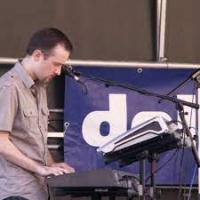
Jeremy Dale Roberts was an English composer and teacher. After early contact with Ralph Vaughan Williams and Gerald Finzi, Dale Roberts studied with William Alwyn and Priaulx Rainier at the Royal Academy of Music, London.
Tchaikovsky

Pyotr Il'yich Tchaikovsky (May 7 1840 â November 6 1893) was a Russian composer of the Romantic era. While not part of the nationalistic music group known as "The Five", Tchaikovsky wrote music which, in the opinion of Harold Schonberg, was distinctly Russian: plangent, introspective, with modally-inflected melody and harmony.
Aesthetically, Tchaikovsky remained open to all aspects of Saint Petersburg musical life. He was impressed by Serov and Balakirev as well as the classical values upheld by the conservatory. Both the progressive and conservative camps in Russian music at the time attempted to win him over. Tchaikovsky charted his compositional course between these two factions, retaining his individuality as a composer as well as his Russian identity. In this he was influenced by the ideals of his teacher Nikolai Rubinstein and Nikolai's brother Anton.
Tchaikovsky's musical cosmopolitanism led him to be favored by many Russian music-lovers over the "Russian" harmonies and styles of Mussorgsky, Borodin and Rimsky-Korsakov.
Nonetheless he frequently adapted Russian traditional melodies and dance forms in his music, which enhanced his success in his home country. The success in St. Petersburg at the premiere of his Third Orchestral Suite may have been due in large part to his concluding the work with a polonaise. He also used a polonaise for the final movement of his Third Symphony.
Aesthetically, Tchaikovsky remained open to all aspects of Saint Petersburg musical life. He was impressed by Serov and Balakirev as well as the classical values upheld by the conservatory. Both the progressive and conservative camps in Russian music at the time attempted to win him over. Tchaikovsky charted his compositional course between these two factions, retaining his individuality as a composer as well as his Russian identity. In this he was influenced by the ideals of his teacher Nikolai Rubinstein and Nikolai's brother Anton.
Tchaikovsky's musical cosmopolitanism led him to be favored by many Russian music-lovers over the "Russian" harmonies and styles of Mussorgsky, Borodin and Rimsky-Korsakov.
Nonetheless he frequently adapted Russian traditional melodies and dance forms in his music, which enhanced his success in his home country. The success in St. Petersburg at the premiere of his Third Orchestral Suite may have been due in large part to his concluding the work with a polonaise. He also used a polonaise for the final movement of his Third Symphony.
Higurashi

Higurashi When They Cry, known simply as When They Cry for the North American release of the anime adaptation, is a Japanese murder mystery dōjin soft visual novel series produced by 07th Expansion. The games are built on the NScripter game engine and the Microsoft Windows operating system
Hiromi Uehara

Hiromi Uehara (上原ひろみ, born 26 March 1979), known as Hiromi, is a jazz composer and pianist born in Hamamatsu, Japan. She is known for her virtuosic technique, energetic live performances and blend of musical genres such as post-bop, progressive rock, classical and fusion in her compositions.
Michael Daly
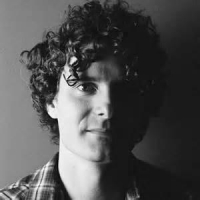
Mike Daly is an American record producer, songwriter, and multi-instrumentalist. Daly attended the Berklee College of Music in Boston, graduating in 1994. Daly first came to prominence as the Whiskeytown resident multi-instrumentalist and co-writer. He wrote or co-wrote many of the songs on the Pneumonia album and has contributed to all of Caitlin Cary's solo releases.Daly has gone on to have a successful career as a studio musician, songwriter, and producer. He's worked with many artists in a range of different genres including Jason Mraz, Lana Del Rey, Imagine Dragons, Young the Giant, Grace Potter and the Nocturnals, The Plain White T's, and Jimmy Barnes.
Aqua timez

Aqua timezFutoshi and OKP-Star met on with9.com in 2000 and attempted to start a band together. Unable to agree on the band's future, the two disbanded. In 2003, the current band members gathered and formed Aqua Timez. Their first independent music mini album, Sora Ippai ni Kanaderu Inori, was released in August 2005.[3
Pulp
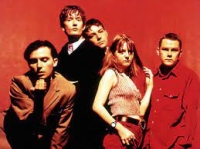
Pulp were an English rock band formed in Sheffield in 1978. Their best-known line-up from their heyday consisted of Jarvis Cocker, Russell Senior, Candida Doyle, Nick Banks, Steve Mackey and Mark Webber.
Beyonce Knowles

Beyoncé Giselle Knowles (born September 4, 1981), often referred professionally under the mononym Beyoncé (pronounced /biˈjɒn.seɪ/ bee-YON-say), is an American R&B singer, songwriter, record producer, actress and model. Born and raised in Houston, Texas, she enrolled in various performing arts schools and was first exposed to singing and dancing competitions as a child. Knowles rose to fame in the late 1990s as the lead singer of the R&B girl group Destiny's Child. According to Sony, Knowles' record sales, combined with those of the group's, have surpassed 100 million.
During the hiatus of Destiny's Child in 2003 Knowles released her debut solo album Dangerously in Love, which spawned the hits "Crazy in Love" and "Baby Boy", and became one of the most successful albums of that year, earning her a then record-tying five Grammy awards. Following the group's disbandment in 2005, Knowles released B'Day in 2006, which debuted at number one on the Billboard charts and included the hits "Déjà Vu" and "Irreplaceable". Her third solo album I Am… Sasha Fierce, released in November 2008, included the anthemic "Single Ladies (Put a Ring on It)", and earned her six Grammy Awards, breaking the record for most Grammy awards won by a female artist in one night.
Knowles began her acting career in 2001, appearing in the musical film Carmen: A Hip Hopera. In 2006, she starred in the lead role in the film adaptation of the 1981 Broadway musical Dreamgirls, for which she earned two Golden Globe nominations. Knowles launched her family's fashion line, House of Deréon, in 2004, and has endorsed such brands as Pepsi, Tommy Hilfiger, Armani and L'Oréal. In 2009, Forbes listed Knowles fourth on its list of the 100 Most Powerful and Influential Celebrities in the world, third on its list of the top-grossing musicians, and number one on the list of top Best-Paid Celebs Under 30 with over $87 million dollars in earnings between 2008 and 2009.
Knowles has attained five Hot 100 number one singles, becoming one of the two female artists—joint with Rihanna—with the most number ones attained within the 2000s, excluding her three Hot 100 number one singles with Destiny's Child. On December 11, 2009 Billboard listed Knowles as the top female artist of the decade.
During the hiatus of Destiny's Child in 2003 Knowles released her debut solo album Dangerously in Love, which spawned the hits "Crazy in Love" and "Baby Boy", and became one of the most successful albums of that year, earning her a then record-tying five Grammy awards. Following the group's disbandment in 2005, Knowles released B'Day in 2006, which debuted at number one on the Billboard charts and included the hits "Déjà Vu" and "Irreplaceable". Her third solo album I Am… Sasha Fierce, released in November 2008, included the anthemic "Single Ladies (Put a Ring on It)", and earned her six Grammy Awards, breaking the record for most Grammy awards won by a female artist in one night.
Knowles began her acting career in 2001, appearing in the musical film Carmen: A Hip Hopera. In 2006, she starred in the lead role in the film adaptation of the 1981 Broadway musical Dreamgirls, for which she earned two Golden Globe nominations. Knowles launched her family's fashion line, House of Deréon, in 2004, and has endorsed such brands as Pepsi, Tommy Hilfiger, Armani and L'Oréal. In 2009, Forbes listed Knowles fourth on its list of the 100 Most Powerful and Influential Celebrities in the world, third on its list of the top-grossing musicians, and number one on the list of top Best-Paid Celebs Under 30 with over $87 million dollars in earnings between 2008 and 2009.
Knowles has attained five Hot 100 number one singles, becoming one of the two female artists—joint with Rihanna—with the most number ones attained within the 2000s, excluding her three Hot 100 number one singles with Destiny's Child. On December 11, 2009 Billboard listed Knowles as the top female artist of the decade.
Radiohead

Radiohead are an English alternative rock band from Oxfordshire. The band is composed of Thom Yorke (lead vocals, rhythm guitar, piano, electronics), Jonny Greenwood (lead guitar, other instruments), Ed O'Brien (guitar, backing vocals), Colin Greenwood (bass guitar, synthesisers) and Phil Selway (drums, percussion). Since 1993, Radiohead have released seven studio albums. The band have sold over 25 million albums as of 2007.
Radiohead released their first single, "Creep", in 1992. Their debut album, Pablo Honey, followed in 1993. "Creep" was initially unsuccessful, but the song became a worldwide hit when reissued a year later, and the band were almost branded as one hit wonders. Radiohead's popularity in the United Kingdom increased with the release of their second album, The Bends (1995). The band's textured guitar atmospheres and Yorke's falsetto singing were warmly received by critics and fans. Radiohead's third album, OK Computer (1997), propelled the band to greater fame worldwide. Featuring an expansive sound and themes of alienation from the modern world, OK Computer has often been acclaimed as a landmark record of the 1990s.
The release of Kid A (2000) and Amnesiac (2001) saw Radiohead reach the peak of their popularity, although the albums divided critical opinion. This period marked a change in Radiohead's musical style, with their incorporation of avant-garde electronic music, Krautrock and jazz influences. Hail to the Thief (2003), which mixed guitar-driven rock with electronics and contemporary lyrics, was the band's final album for their record label, EMI. Radiohead's seventh album, In Rainbows (2007), was first released independently as a digital download for which customers selected their own price, later meeting with critical and chart success.
Radiohead released their first single, "Creep", in 1992. Their debut album, Pablo Honey, followed in 1993. "Creep" was initially unsuccessful, but the song became a worldwide hit when reissued a year later, and the band were almost branded as one hit wonders. Radiohead's popularity in the United Kingdom increased with the release of their second album, The Bends (1995). The band's textured guitar atmospheres and Yorke's falsetto singing were warmly received by critics and fans. Radiohead's third album, OK Computer (1997), propelled the band to greater fame worldwide. Featuring an expansive sound and themes of alienation from the modern world, OK Computer has often been acclaimed as a landmark record of the 1990s.
The release of Kid A (2000) and Amnesiac (2001) saw Radiohead reach the peak of their popularity, although the albums divided critical opinion. This period marked a change in Radiohead's musical style, with their incorporation of avant-garde electronic music, Krautrock and jazz influences. Hail to the Thief (2003), which mixed guitar-driven rock with electronics and contemporary lyrics, was the band's final album for their record label, EMI. Radiohead's seventh album, In Rainbows (2007), was first released independently as a digital download for which customers selected their own price, later meeting with critical and chart success.
Megadeth

Megadeth is an American heavy metal band from Los Angeles, California. Guitarist Dave Mustaine and bassist David Ellefson formed the band in 1983 shortly after Mustaine's dismissal from Metallica. Along with Metallica, Anthrax, and Slayer, Megadeth is one of the "big four" of American thrash metal, responsible for its development and popularization. Their music features complex arrangements and fast rhythm sections, and lyrical themes of death, war, politics, personal relationships and religion.
Joe Hisaishi

Mamoru Fujisawa (藤澤 守 Fujisawa Mamoru?), known professionally as Joe Hisaishi (久石 譲 Hisaishi Jō?, born December 6, 1950), is a composer and director known for over 100 film scores and solo albums dating back to 1981.
While possessing a stylistically distinct sound, Hisaishi's music has been known to explore and incorporate different genres, including minimalist, experimental electronic, European classical, and Japanese classical. Lesser known are the other musical roles he plays; he is also a typesetter, author, arranger, and head of an orchestra.
He is best known for his work with animator Hayao Miyazaki, having composed scores for many of his films including Nausicaä of the Valley of the Wind (1984), My Neighbor Totoro (1988), Princess Mononoke (1997), Spirited Away (2001), Howl's Moving Castle (2004) and Ponyo (2008). He is also recognized for the soundtracks he has provided for filmmaker 'Beat' Takeshi Kitano, including Dolls (2002), Kikujiro (1999), Hana-bi (1997), Kids Return (1996), Sonatine (1993).
While possessing a stylistically distinct sound, Hisaishi's music has been known to explore and incorporate different genres, including minimalist, experimental electronic, European classical, and Japanese classical. Lesser known are the other musical roles he plays; he is also a typesetter, author, arranger, and head of an orchestra.
He is best known for his work with animator Hayao Miyazaki, having composed scores for many of his films including Nausicaä of the Valley of the Wind (1984), My Neighbor Totoro (1988), Princess Mononoke (1997), Spirited Away (2001), Howl's Moving Castle (2004) and Ponyo (2008). He is also recognized for the soundtracks he has provided for filmmaker 'Beat' Takeshi Kitano, including Dolls (2002), Kikujiro (1999), Hana-bi (1997), Kids Return (1996), Sonatine (1993).
Kevin Cronin

Kevin Patrick Cronin is the lead vocalist, rhythm guitarist, and occasional pianist for the American rock band, REO Speedwagon. REO Speedwagon had several hits on the Billboard Hot 100 throughout the 1970s and 1980s, including two chart-toppers written by Cronin: "Keep on Loving You" and "Can't Fight This Feeling".
Gerardo Di Giusto

Pianist and composer Gerardo Di Giusto was born on January 30, 1961 in Córdoba, Argentina. After attending the National Music Academy of Córdoba, he furthered his studies in music in Paris at the "CIM" Jazz school and the "Ecole Normale de Musique de Paris" where he graduated with a degree in Musical Direction.
Clifford Brown

Clifford Brown, American jazz trumpeter. In 1953 he entered the Lionel Hampton orchestra. In 1954, together with drummer Max Roach, he formed a quintet that quickly became famous. It has established itself with its powerful work, richness of inventions and beautiful timbre. His style is a transition between "bop" and "cool".
Adolphe Adam
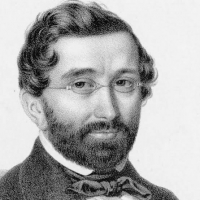
Adolphe Charles Adam (French: ; 24 July 1803 – 3 May 1856) was a French composer and music critic. A prolific composer of operas and ballets, he is best known today for his ballets Giselle (1841) and Le corsaire (1856, his last work), his operas Le postillon de Lonjumeau (1836), Le toréador (1849) and Si j'étais roi (1852) and his Christmas carol Minuit, chrétiens! (1844), later set to different English lyrics and widely sung as "O Holy Night" (1847). Adam was a noted teacher, who taught Delibes and other influential composers.
Hyun Bin
HyunBin (현빈) is a South Korean rapper and singer currently under TR Entertainment. She is a member of the girl group TRI.BE.
Legally Blonde
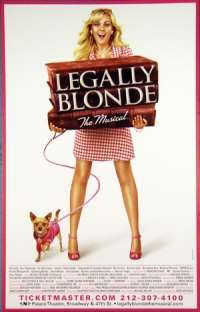
Legally Blonde is a musical based on the Amanda Brown novel and the 2001 film of the same name. The musical features a book by Heather Hach, music and lyrics by Laurence O'Keefe and Nell Benjamin, with direction and choreography by Jerry Mitchell.
After a pre-Broadway tryout in San Francisco, California, the musical opened on Broadway on April 29, 2007 to mostly positive reviews. The musical was recorded for MTV in September 2007 and aired in October 2007.
A United States first national touring production is currently in production.
Legally Blonde played its final performance on Broadway on October 19, 2008.
After a pre-Broadway tryout in San Francisco, California, the musical opened on Broadway on April 29, 2007 to mostly positive reviews. The musical was recorded for MTV in September 2007 and aired in October 2007.
A United States first national touring production is currently in production.
Legally Blonde played its final performance on Broadway on October 19, 2008.
Astor Piazzolla

Ástor Pantaleón Piazzolla (March 11, 1921 – July 4, 1992) was an Argentine tango composer and bandoneón player. His oeuvre revolutionized the traditional tango into a new style termed nuevo tango, incorporating elements from jazz and classical music. An excellent bandoneonist, he regularly performed his own compositions with different ensembles.
Piazzolla's nuevo tango was distinct from the traditional tango in its incorporation of elements of jazz, its use of extended harmonies and dissonance, its use of counterpoint, and its ventures into extended compositional forms. As Argentine psychoanalyst Carlos Kuri has pointed out, Piazzolla's fusion of tango with this wide range of other recognizable Western musical elements was so successful that it produced a new individual style transcending these influences. It is precisely this success, and individuality, that makes it hard to pin down where particular influences reside in his compositions, but some aspects are clear. The use of the passacaglia technique of a circulating bass line and harmonic sequence, invented and much used in 17th and 18th century baroque music but also central to the idea of jazz "changes", predominates in most of Piazzolla's mature compositions. Another clear reference to the baroque is the often complex and virtuosic counterpoint that sometimes follows strict fugal behavior but more often simply allows each performer in the group to assert his voice. A further technique that emphasises this sense of democracy and freedom among the musicians is improvisation that is borrowed from jazz in concept, but in practice involves a different vocabulary of scales and rhythms that stay within the parameters of the established tango sound-world. Pablo Ziegler has been particularly responsible for developing this aspect of the style both within Piazzolla's groups and since the composer's death.
Piazzolla's nuevo tango was distinct from the traditional tango in its incorporation of elements of jazz, its use of extended harmonies and dissonance, its use of counterpoint, and its ventures into extended compositional forms. As Argentine psychoanalyst Carlos Kuri has pointed out, Piazzolla's fusion of tango with this wide range of other recognizable Western musical elements was so successful that it produced a new individual style transcending these influences. It is precisely this success, and individuality, that makes it hard to pin down where particular influences reside in his compositions, but some aspects are clear. The use of the passacaglia technique of a circulating bass line and harmonic sequence, invented and much used in 17th and 18th century baroque music but also central to the idea of jazz "changes", predominates in most of Piazzolla's mature compositions. Another clear reference to the baroque is the often complex and virtuosic counterpoint that sometimes follows strict fugal behavior but more often simply allows each performer in the group to assert his voice. A further technique that emphasises this sense of democracy and freedom among the musicians is improvisation that is borrowed from jazz in concept, but in practice involves a different vocabulary of scales and rhythms that stay within the parameters of the established tango sound-world. Pablo Ziegler has been particularly responsible for developing this aspect of the style both within Piazzolla's groups and since the composer's death.
Coldplay

Coldplay are a rock band formed in London, England in 1997. The group comprises vocalist/pianist/guitarist Chris Martin, lead guitarist Jonny Buckland, bassist Guy Berryman, and drummer/multi-instrumentalist Will Champion. Coldplay have sold 34.6 million albums, and are also known for their hit singles, such as "Yellow", "The Scientist", "Speed of Sound", "Fix You", "Viva la Vida" and the Grammy Award-winning "Clocks".
Coldplay achieved worldwide fame with the release of their single "Yellow", followed by their debut album, Parachutes (2000), which was nominated for the Mercury Prize. Its follow-up, A Rush of Blood to the Head (2002) won multiple awards such as NME's Album of the Year and was later included on Rolling Stone magazine's 500 Greatest Albums of All Time list, ranking at #473. Their next release, X&Y (2005), received a slightly less enthusiastic yet still generally positive reception. The band's fourth studio album, Viva la Vida or Death and All His Friends (2008), was produced by Brian Eno and released again to largely favourable reviews. All of Coldplay's albums have enjoyed great commercial success.
Coldplay's early material was compared to acts such as Jeff Buckley, U2, and Travis. Coldplay have been an active supporter of various social and political causes, such as Oxfam's Make Trade Fair campaign and Amnesty International. The group have also performed at various charity projects such as Band Aid 20, Live 8, and the Teenage Cancer Trust.
Coldplay achieved worldwide fame with the release of their single "Yellow", followed by their debut album, Parachutes (2000), which was nominated for the Mercury Prize. Its follow-up, A Rush of Blood to the Head (2002) won multiple awards such as NME's Album of the Year and was later included on Rolling Stone magazine's 500 Greatest Albums of All Time list, ranking at #473. Their next release, X&Y (2005), received a slightly less enthusiastic yet still generally positive reception. The band's fourth studio album, Viva la Vida or Death and All His Friends (2008), was produced by Brian Eno and released again to largely favourable reviews. All of Coldplay's albums have enjoyed great commercial success.
Coldplay's early material was compared to acts such as Jeff Buckley, U2, and Travis. Coldplay have been an active supporter of various social and political causes, such as Oxfam's Make Trade Fair campaign and Amnesty International. The group have also performed at various charity projects such as Band Aid 20, Live 8, and the Teenage Cancer Trust.
Jeremy Soule

Jeremy Soule (/ˈsoʊl/; born December 19, 1975) is an American composer of soundtracks for film, television and video games. He has won multiple awards and has been described as the "John Williams of video game music" and "a model of success" for Western composers. He has composed soundtracks for over 60 games and over a dozen other works during his career. He is best known for his work in The Elder Scrolls and Guild Wars series, and several other top-selling titles such as Total Annihilation, Neverwinter Nights, Dungeon Siege, Star Wars: Knights of the Old Republic, and Harry Potter.
Annie

Annie is a 1982 musical film based upon the popular 1977 stage musical of the same name, with music by Charles Strouse, lyrics by Martin Charnin, and the book by Thomas Meehan. It was released in 1982 by Columbia Pictures.
The film version was directed by John Huston, and starred Carol Burnett and Albert Finney. This was Huston's first and only film musical.
The film version was directed by John Huston, and starred Carol Burnett and Albert Finney. This was Huston's first and only film musical.
Georges Bizet

Georges Bizet (25 October 1838 – 3 June 1875) was a French composer and pianist of the Romantic era. He is best known for the opera Carmen.
Bizet was born at 26 rue de la Tour d'Auvergne in the 9th arrondissement of Paris in 1838. He was registered with the legal name Alexandre César Léopold Bizet, but he was baptised on 16 March 1840 with the first name Georges, and he was always known thereafter as Georges Bizet. His father Adolphe Armand Bizet (1810-86) was an amateur singer and composer, and his mother, Aimée Léopoldine Joséphine née Delsarte (1814-61), was the sister of the famous singing teacher François Delsarte.
He entered the Paris Conservatory of Music on 9 October 1848, a fortnight before his tenth birthday. His teachers there were Pierre Zimmermann (fugue and counterpoint; often assisted by his son-in-law Charles Gounod), Antoine François Marmontel (piano), François Benoist (organ) and, on Zimmermann's death, Fromental Halévy, whose daughter he himself later married. He won first prizes for organ and fugue in 1855 and completed his earliest compositions.
His first symphony, the Symphony in C, was written in November 1855, when he was seventeen, evidently as a student assignment. It was unknown to the world until 1933, when it was discovered in the archives of the Paris Conservatory library. Upon its first performance in 1935, it was immediately hailed as a junior masterwork and a welcome addition to the early Romantic period repertoire. The symphony bears a stylistic resemblance to the first symphony of Gounod, first played earlier in the same year, and which Bizet had arranged for two pianos although present-day listeners may discern a similarity to music of Franz Schubert, whose work was little known in France at the time the symphony was written.
In 1857, a setting of the one-act operetta Le docteur Miracle won him a share in a prize offered by Jacques Offenbach. He also won the music composition scholarship of the Prix de Rome, the conditions of which required him to study in Rome for three years. There, his talent developed as he wrote such works as the opera buffa Don Procopio (1858-59). There he also composed his only major sacred work, Te Deum (1858), which he submitted to the Prix Rodrigues competition, a contest for Prix de Rome winners only. Bizet failed to win the Prix Rodrigues, and the Te Deum score remained unpublished until 1971. He made two attempts to write another symphony in 1859, but destroyed the manuscripts in December of that year. Apart from this period in Rome, Bizet lived in the Paris area all his life.
Shortly after leaving Rome in July 1860, but while still touring in Italy, he had the idea of writing a symphony in which each of the four movements would be a musical evocation of a different Italian city – Rome, Venice, Florence and Naples. On hearing of his mother's serious illness he cut short his Italian travels and returned to Paris in September 1860; she died a year later. The Scherzo of the symphony was completed by November 1861, but it was not until 1866 that the first version of the whole symphony was written. He subjected it to a number of revisions through to 1871, but died before ever producing what he considered the definitive version. For this reason, the work is sometimes described as "unfinished", but this is an inaccurate description as it was fully scored. It was published in 1880 as the Roma Symphony.
Bizet was born at 26 rue de la Tour d'Auvergne in the 9th arrondissement of Paris in 1838. He was registered with the legal name Alexandre César Léopold Bizet, but he was baptised on 16 March 1840 with the first name Georges, and he was always known thereafter as Georges Bizet. His father Adolphe Armand Bizet (1810-86) was an amateur singer and composer, and his mother, Aimée Léopoldine Joséphine née Delsarte (1814-61), was the sister of the famous singing teacher François Delsarte.
He entered the Paris Conservatory of Music on 9 October 1848, a fortnight before his tenth birthday. His teachers there were Pierre Zimmermann (fugue and counterpoint; often assisted by his son-in-law Charles Gounod), Antoine François Marmontel (piano), François Benoist (organ) and, on Zimmermann's death, Fromental Halévy, whose daughter he himself later married. He won first prizes for organ and fugue in 1855 and completed his earliest compositions.
His first symphony, the Symphony in C, was written in November 1855, when he was seventeen, evidently as a student assignment. It was unknown to the world until 1933, when it was discovered in the archives of the Paris Conservatory library. Upon its first performance in 1935, it was immediately hailed as a junior masterwork and a welcome addition to the early Romantic period repertoire. The symphony bears a stylistic resemblance to the first symphony of Gounod, first played earlier in the same year, and which Bizet had arranged for two pianos although present-day listeners may discern a similarity to music of Franz Schubert, whose work was little known in France at the time the symphony was written.
In 1857, a setting of the one-act operetta Le docteur Miracle won him a share in a prize offered by Jacques Offenbach. He also won the music composition scholarship of the Prix de Rome, the conditions of which required him to study in Rome for three years. There, his talent developed as he wrote such works as the opera buffa Don Procopio (1858-59). There he also composed his only major sacred work, Te Deum (1858), which he submitted to the Prix Rodrigues competition, a contest for Prix de Rome winners only. Bizet failed to win the Prix Rodrigues, and the Te Deum score remained unpublished until 1971. He made two attempts to write another symphony in 1859, but destroyed the manuscripts in December of that year. Apart from this period in Rome, Bizet lived in the Paris area all his life.
Shortly after leaving Rome in July 1860, but while still touring in Italy, he had the idea of writing a symphony in which each of the four movements would be a musical evocation of a different Italian city – Rome, Venice, Florence and Naples. On hearing of his mother's serious illness he cut short his Italian travels and returned to Paris in September 1860; she died a year later. The Scherzo of the symphony was completed by November 1861, but it was not until 1866 that the first version of the whole symphony was written. He subjected it to a number of revisions through to 1871, but died before ever producing what he considered the definitive version. For this reason, the work is sometimes described as "unfinished", but this is an inaccurate description as it was fully scored. It was published in 1880 as the Roma Symphony.
Real Book

The Real Book refers to compilations of lead sheets for jazz standards. It usually refers to the first volume of a series of books transcribed and collated by Berklee College of Music students during the 1970s.The name is derived from "fake books", so called because they contained only rough outlines of music pieces rather than fully notated scores. Early fake books were often used by professional bands who performed mostly standards, often more geared to society and dance bands rather than jazz ensembles, and devoted much space to show tunes, novelty tunes, traditional jazz, etc. The first three Real Book volumes, in contrast, contained many bebop and other jazz standards that were likely to be encountered on jazz gigs at the time. For this reason, the books were quickly adopted among jazz players in the 1970s, particularly on the east coast.
Glenn Stafford

Glenn Stafford is a senior composer at Blizzard Entertainment. He has composed music for its StarCraft and Warcraft universes.
Paul Simon
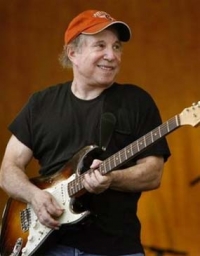
Paul Frederic Simon (born October 13, 1941) is an American songwriter, musician, and member of the Rock and Roll Hall of Fame. In 2006, Time magazine called him one of the 100 "people who shape our world." As of 2007, he resides in New Canaan, Connecticut.
He released Paul Simon in 1972, which contained one of his first experiments with world music, the Jamaican-inspired Mother and Child Reunion, and There Goes Rhymin' Simon in 1973. His 1975 album Still Crazy After All These Years is considered to be among his finest work, particularly the title track and the hit single "50 Ways to Leave Your Lover." The One Trick Pony album, Simon's first album with Warner Bros. Records was also paired with a major motion picture of the same name, with Simon in the starring role. Simon's next album Hearts and Bones, while critically acclaimed, did not yield any hit singles and marked a lull in his commercial popularity in the early 1980s.
In 1985, Simon lent his talents to USA for Africa and performed on the famine relief fundraising single "We Are the World". In 1986 he released the immensely popular Graceland, for which he won a Grammy. The album featured the groundbreaking use of African rhythms and performers such as Ladysmith Black Mambazo. In 1990, he followed up Graceland with the commercially successful and consistent successor album The Rhythm of the Saints, which featured Brazilian musical themes.
His 2000 studio album You're the One, did not reach the commercial heights of previous albums but was considered by many fans and critics to be an artistic success and received a Grammy nomination for Album of the Year. Simon's latest album, Surprise, produced by himself and Brian Eno, was released on May 9, 2006. In commenting on US TV show Ellen what drove him to write material for this latest album, Simon noted the events of September 11, 2001 and also turning 60 since his previous album You're the One.
He released Paul Simon in 1972, which contained one of his first experiments with world music, the Jamaican-inspired Mother and Child Reunion, and There Goes Rhymin' Simon in 1973. His 1975 album Still Crazy After All These Years is considered to be among his finest work, particularly the title track and the hit single "50 Ways to Leave Your Lover." The One Trick Pony album, Simon's first album with Warner Bros. Records was also paired with a major motion picture of the same name, with Simon in the starring role. Simon's next album Hearts and Bones, while critically acclaimed, did not yield any hit singles and marked a lull in his commercial popularity in the early 1980s.
In 1985, Simon lent his talents to USA for Africa and performed on the famine relief fundraising single "We Are the World". In 1986 he released the immensely popular Graceland, for which he won a Grammy. The album featured the groundbreaking use of African rhythms and performers such as Ladysmith Black Mambazo. In 1990, he followed up Graceland with the commercially successful and consistent successor album The Rhythm of the Saints, which featured Brazilian musical themes.
His 2000 studio album You're the One, did not reach the commercial heights of previous albums but was considered by many fans and critics to be an artistic success and received a Grammy nomination for Album of the Year. Simon's latest album, Surprise, produced by himself and Brian Eno, was released on May 9, 2006. In commenting on US TV show Ellen what drove him to write material for this latest album, Simon noted the events of September 11, 2001 and also turning 60 since his previous album You're the One.
Aida

Aida is a musical drama in two acts based on Giuseppe Verdi's Italian-language opera by the same name, which is based on a story by Auguste Mariette which is based on Shakespeare's Romeo and Juliet. The musical was produced by Hyperion Theatricals, a unit within Disney Theatrical, with music by Elton John, lyrics by Tim Rice, and book by Linda Woolverton, Robert Falls, and David Henry Hwang.
Elaborate Lives: The Legend of Aida had its world premiere at the Alliance Theatre in Atlanta, Georgia with the production running from September 16 to November 8, 1998. A new, revised production opened on November 12, 1999 at the Cadillac Palace in Chicago. The Broadway production, titled Elton John and Tim Rice's Aida, ran at the Palace Theatre from March 23, 2000 to September 4, 2004 for a total of 1,852 performances (and 30 previews). There was also produced a national tour and several international productions. Aida has recently become popular among school and community theaters. Licensing of these amateur productions of Aida is through Music Theatre International.
Elaborate Lives: The Legend of Aida had its world premiere at the Alliance Theatre in Atlanta, Georgia with the production running from September 16 to November 8, 1998. A new, revised production opened on November 12, 1999 at the Cadillac Palace in Chicago. The Broadway production, titled Elton John and Tim Rice's Aida, ran at the Palace Theatre from March 23, 2000 to September 4, 2004 for a total of 1,852 performances (and 30 previews). There was also produced a national tour and several international productions. Aida has recently become popular among school and community theaters. Licensing of these amateur productions of Aida is through Music Theatre International.
Giuseppe Giordani
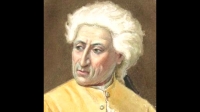
Giuseppe Tommaso Giovanni Giordani was an Italian composer, mainly of opera. Giordani's parents were Domenico Giordani and Anna Maria Tosato. He studied music in Naples with Domenico Cimarosa and Niccolò Antonio Zingarelli. In 1774 he was appointed as music director of the chapel of the Duomo of Naples.
Ryuichi Sakamoto
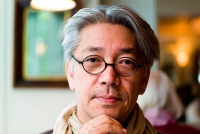
Ryuichi Sakamoto (坂本 龍一 Sakamoto Ryūichi?, born January 17, 1952) is an Academy Award-, Grammy-, and Golden Globe-winning Japanese musician, composer, record producer and actor, based in New York and Tokyo. He played keyboards in the influential Japanese electropop band Yellow Magic Orchestra. His 1999 musical composition "Energy Flow" is the first number-one instrumental single in the Japan's Oricon charts history. He was ranked at number 59 in a list of the top 100 most influential musicians compiled by HMV Japan.
Bill Rose
Billy Rose was an American impresario, theatrical showman and lyricist. For years both before and after World War II, Billy Rose was a major force in entertainment, with shows such as Billy Rose's Crazy Quilt, Jumbo, Billy Rose's Aquacade, and Carmen Jones
Hugh Martin

Hugh Martin was an American musical theater and film composer, arranger, vocal coach, and playwright. He was best known for his score for the 1944 MGM musical Meet Me in St. Louis, in which Judy Garland sang three Martin songs, "The Boy Next Door," "The Trolley Song," and "Have Yourself a Merry Little Christmas."
Fripside

fripSide is a Japanese pop and trance duo originally formed by composer Satoshi Yaginuma (Sat) and singer Nao in February 2002.In a 2008 interview, Satoshi said that he was a fan of TM Network and its member Tetsuya Komuro in his elementary and junior high school days and began to produce his music at the age of 14.When the group started, they were releasing their songs on the Japanese amateur and indie community, Muzie. fripSide's albums were always high in sales at Muzie's online CD shop. As of July 2006, more than 6,000 copies of the three original albums have been sold.
Queen

Queen were an English rock band formed in 1970 in London by guitarist Brian May, lead vocalist Freddie Mercury, and drummer Roger Taylor, with bass guitarist John Deacon completing the lineup the following year. While it is uncertain how many albums the band has sold, estimations range from 130 million to over 300 million albums worldwide.
The band is noted for their musical diversity, multi-layered arrangements, vocal harmonies, and incorporation of audience participation into their live performances. Their 1985 Live Aid performance was voted the best live rock performance of all time in an industry poll.
Queen had moderate success in the early 1970s, with the albums Queen and Queen II, but it was with the release of Sheer Heart Attack in 1974 and A Night at the Opera the following year that the band gained international success. They have released fifteen studio albums, five live albums, and numerous compilation albums. Eighteen of these have reached number one on charts around the world.
Following Mercury's death in 1991 and Deacon's retirement later in the decade, May and Taylor have performed infrequently under the Queen name. Since 2005 they have been collaborating with Paul Rodgers, under the moniker Queen + Paul Rodgers.
The band is noted for their musical diversity, multi-layered arrangements, vocal harmonies, and incorporation of audience participation into their live performances. Their 1985 Live Aid performance was voted the best live rock performance of all time in an industry poll.
Queen had moderate success in the early 1970s, with the albums Queen and Queen II, but it was with the release of Sheer Heart Attack in 1974 and A Night at the Opera the following year that the band gained international success. They have released fifteen studio albums, five live albums, and numerous compilation albums. Eighteen of these have reached number one on charts around the world.
Following Mercury's death in 1991 and Deacon's retirement later in the decade, May and Taylor have performed infrequently under the Queen name. Since 2005 they have been collaborating with Paul Rodgers, under the moniker Queen + Paul Rodgers.
Evanesence
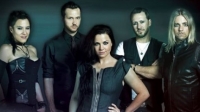
Evanescence (/ˌɛvəˈnɛsns, ˌiːvə-/) is an American rock band founded in Little Rock, Arkansas, in 1995 by singer and pianist Amy Lee and guitarist Ben Moody. After recording independent albums, the band released their first full-length album, Fallen, on Wind-up Records in 2003. Fallen sold more than 17 million copies worldwide and helped the band win two Grammy Awards out of six nominations. A year later, Evanescence released their first live album, Anywhere but Home, which sold more than one million copies worldwide. In 2006, the band released their second studio album, The Open Door, which sold more than five million copies
 Sheet Music 365 is a site for those who wants to access popular sheet music easily,
letting them download the sheet music for free for trial purposes.
It's completely free to download and try the listed sheet music, but you have to delete the files after 24 hours of trial.
Don't forget, if you like the piece of music you have just learned playing,
treat the artist with respect, and go buy the original sheet music.
Sheet Music 365 is a site for those who wants to access popular sheet music easily,
letting them download the sheet music for free for trial purposes.
It's completely free to download and try the listed sheet music, but you have to delete the files after 24 hours of trial.
Don't forget, if you like the piece of music you have just learned playing,
treat the artist with respect, and go buy the original sheet music.
